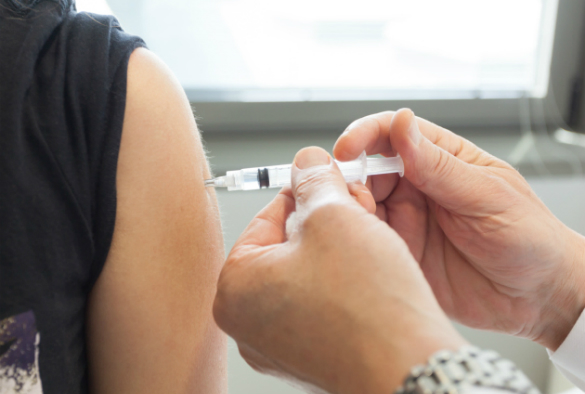
To keep yourself and other students safe, it’s important to check that your vaccinations against diseases such as measles, mumps and rubella, as well as meningitis are up to date.
You can find out if you’re up to date with these by contacting your GP surgery.
Meningococcal ACWY (Meningitis) vaccination
Meningitis and septicaemia can develop suddenly and can kill or leave people with life changing disabilities and health problems.
Higher Education students, particularly freshers, are known to be at increased risk of meningococcal meningitis and septicaemia. Being in confined environments with close contact, such as university halls increase the chances of infection if unprotected.
Most students from the UK have been vaccinated with the Meningitis ACWY immunisation as part of the UK schools’ programme. However, if you have not been vaccinated – or you are not sure – it is important you contact your GP and arrange to receive the vaccines.
If you are under 25 you can arrange to have the vaccination free of charge by registering with a GP in Liverpool. If you’ve not done so already you can register with our local practice here. The vaccine protects against 4 main forms of meningococcal disease but not all, so still know signs and symptoms.
Symptoms of meningitis and septicaemia include: fever, aching muscles and joints, a stiff neck, severe headache and/or a blotchy rash that doesn’t fade when a glass is rolled over it.
If you suspect meningitis or septicaemia getting immediate medical treatment can be life-saving. Dial 999 without delay in a medical emergency.
Measles, Mumps and Rubella (MMR) vaccination
Don’t let measles or mumps ruin your time at university. You can help to protect yourself and stop the spread by checking with your GP that you have had 2 doses of the MMR vaccine.
The MMR vaccination is also part of the UK schools programme, so most UK-based students will have received this. However, if you have not received two doses of the MMR vaccine – or you are not sure – it is important you contact your GP and arrange to receive this.
Please make sure you familiarise yourself with the symptoms of meningitis, measles, mumps and rubella via the NHS website. You should call NHS 111 if you think you might have mumps or have been in contact with someone who has had it.
Flu vaccine
The flu vaccination is offered every year through the NHS to help protect people at risk of getting seriously ill from flu. The vaccine is given to people who:
- have certain health conditions
- are pregnant
- receive a carer’s allowance, or are the main carer for an older or disabled person who may be at risk if you get sick
- live with someone who is more likely to get infections (such as someone who has HIV, has had a transplant or is having certain treatments for cancer, lupus or rheumatoid arthritis)
- are frontline health or social care workers.
The flu vaccine is available at GP surgeries and pharmacies. Click here to find out more.
HPV (human papilloma virus) vaccine
Female students from the UK should have been offered 2 doses of HPV vaccine in Year 8 or Year 9 when aged 13 to 15 years at school. HPV vaccine protects against the human papilloma virus that causes most cervical cancers and some anal, genital, mouth and throat (head and neck) cancers. It also offers protection against the most common genital warts caused by HPV.
Any female student who missed one or both doses of their HPV vaccine is eligible to receive this up to their 25th birthday. Contact your GP to arrange to receive this free of charge.
Find out more about the HPV vaccine on the NHS webpages.
Covid-19 vaccinations
For long term protection, it is really important that students aged 18 years and older have 2 doses of COVID-19 vaccine at least 8 weeks apart and a booster dose 3 months after their last dose.
You may be able to get a seasonal COVID-19 vaccine if you’re at increased risk of getting seriously ill from COVID-19. For example, this may be due to a health condition. The NHS will contact you if your NHS record suggests you may be eligible.
Students registered with a GP can book their appointment at a larger vaccination centre, a community pharmacy run site or at some GP run sites through the National Booking Service website or by phoning 119.